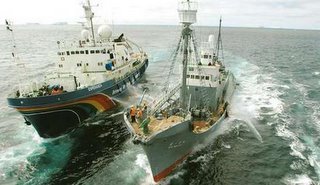
An interesting article appeared in The Age over the weekend, discussing the savvy use of technology in Greenpeace's public relations campaign to "save the whales" in the Southern Ocean.
Thanks to satellite internet and embedded journalists, Greenpeace's PR machine is capable of providing real-time images of its ongoing battle with Japanese "research" vessels currently engaged in annual "data collection". Although the number of whales saved over the past two months is some number less than 1, Greenpeace's efforts have led to outrage, and, of course, outrage leads to action. I'm confident that any action is acceptable, but I'm sure Greenpeace doesn't mind if you channel your action through online donations (readily accessible via plentiful links on the Greenpeace weblog).
Over the short-term, the distribution of benefits appears to be a bit lop-sided: Japan's getting the whales, Greenpeace is getting press and donations (while burning about $9000 a day in diesel - a fossil fuel if I recall). According to Wikipedia, "Paul Watson, who parted ways [with Greenpeace] to found Sea Shepherd, once called Greenpeace 'The Avon ladies of the environmental movement,' because of their door-to-door fund-raising that relies on the media exposure of deliberately orchestrated and highly publicised actions to keep the name of Greenpeace on the front pages."
Then again, it's tactics such as these that led to the 1982 international moratorium on whaling in the first place. Plus, since Sea Shephard just had to abandon their own chase of the Japanese whalers (leaving Greenpeace to soak up all the glory), it looks as though they could do with some donations themselves. Here's hoping that, over the long-term, the whales themselves get a piece of the pie.

UPDATE (1/19/2006): Greenpeace's German contingent has taken the concept of odd publicity stunt to new highs this week after dumping the carcass of a whale on the doorstep of the Japanese embassy in Berlin. According to Deutsche Welle:
"After the 10 to 20-year-old whale died on the Baltic Sea coast on Saturday, Greenpeace offered to transfer it, at their own cost, to the German Oceanographic Museum in Stralsund for testing. The environmental group now admits the move was a trick, and said they did not inform the Oceanographic Museum of the fact that they had planned to used the cadaver as a political protest."
Very sneaky - sounds like the kind of clever plan that could only be crafted under the stimulatory effects of heaps of booze.






No comments:
Post a Comment